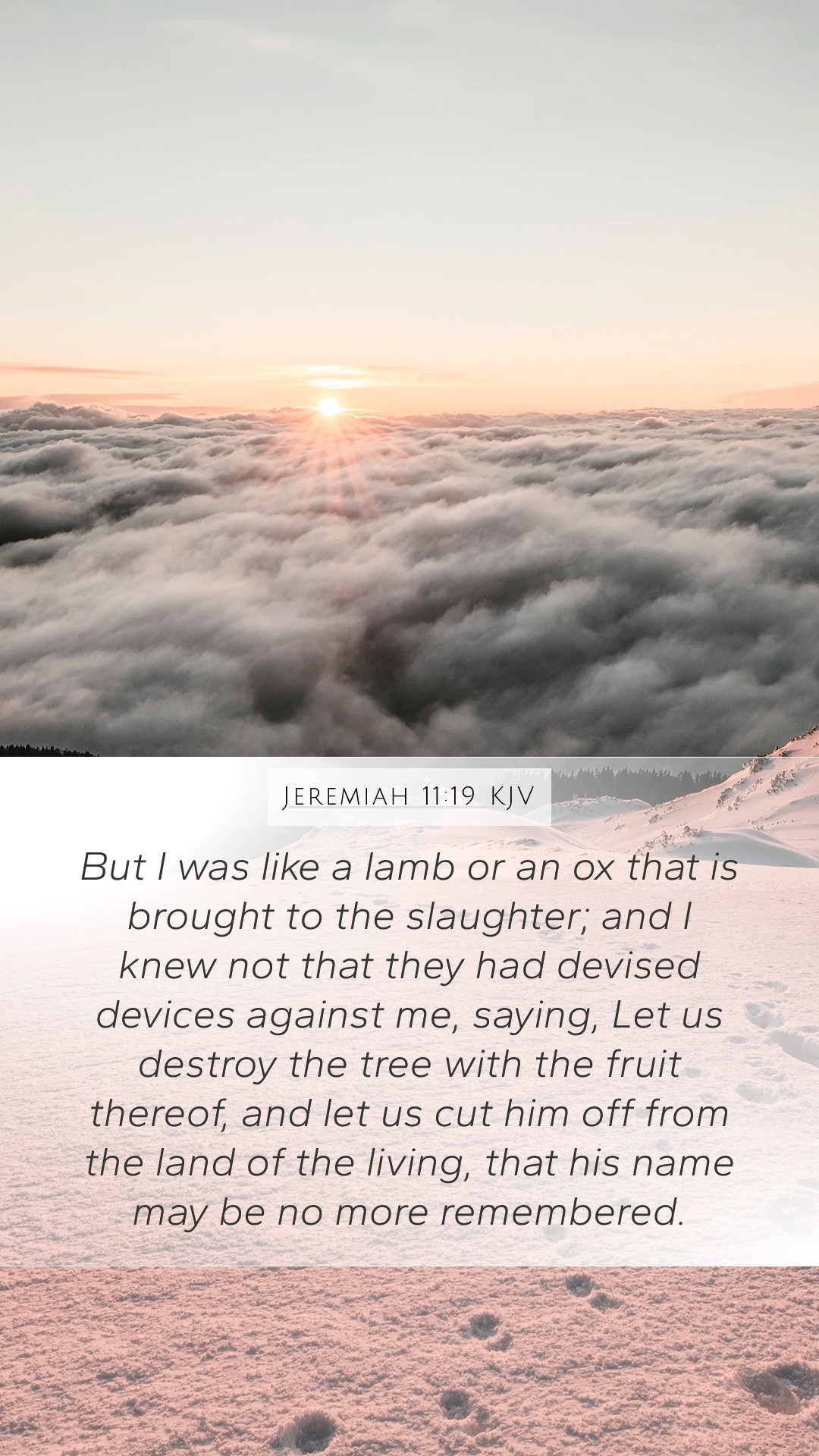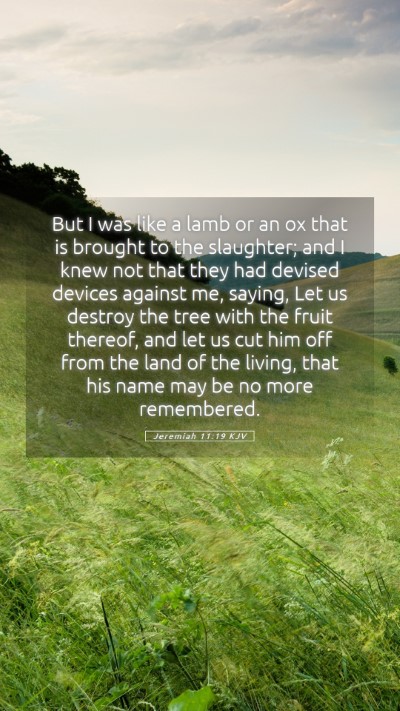Understanding Jeremiah 11:19: A Comprehensive Commentary
Jeremiah 11:19 reads, "But I was like a lamb or an ox that is brought to the slaughter; and I knew not that they had devised devices against me, saying, 'Let us destroy the tree with the fruit thereof, and let us cut him off from the land of the living, that his name may be no more remembered.'" This verse captures the essence of the prophet Jeremiah's lament regarding betrayal and impending doom.
Overview of Jeremiah 11:19
This verse is part of a larger section where God reveals to Jeremiah the conspiracy against him and the judgments that are to come upon the people for their disobedience. It is a profound moment of vulnerability as Jeremiah reflects on his position and the deceit surrounding him.
Bible Verse Meanings and Interpretations
When we delve into the Bible verse meanings of Jeremiah 11:19, various public domain commentaries provide rich insights:
-
Matthew Henry emphasizes that Jeremiah's metaphor of being like a "lamb or an ox" signifies his innocence and helplessness in the face of imminent danger. He points out that this imagery portrays a deep sense of sorrow and betrayal, highlighting Jeremiah's role as a prophet who is unjustly persecuted.
-
Albert Barnes interprets the devices mentioned against Jeremiah to indicate the hostile intentions of his enemies. He notes that the phrase "cut him off from the land of the living" underscores the seriousness of the plots against him, illustrating a desire for complete annihilation, both physically and in terms of memory.
-
Adam Clarke sheds light on the historical context, explaining that Jeremiah faced intense opposition from both the people and leadership of Judah. He interprets the slaughter metaphor as a reflection of the prophet’s awareness of his vulnerability in carrying out his divine mission. Clarke also highlights the significance of the phrase about cutting off one's name, which speaks to the intentions of erasing spiritual influence and legacy.
In-Depth Biblical Exegesis
The Biblical exegesis of Jeremiah 11:19 reveals several layers of meaning:
- Prophetic Suffering: This verse encapsulates the experience of many biblical figures who suffered for their faithfulness to God. Jeremiah symbolizes the suffering servant, reflecting deeper themes found throughout Scripture.
- Human Betrayal: The idea of betrayal is prevalent in many biblical narratives, accentuating the reality of human nature and the tragic consequences of turning away from divine commandments.
- Communal Judgment: God's declaration of judgment upon the people is a recurrent theme in Jeremiah. The prophet's laments serve as warnings to the community, pointing to the need for repentance and awareness of divine retribution.
Applying Bible Verses to Daily Life
In applying Jeremiah 11:19 to contemporary living, one may consider the following:
- This verse serves as a reminder to recognize the signs of betrayal and deception around us, encouraging us to seek discernment through faith.
- It highlights the importance of standing firm in one's beliefs, even when facing opposition or hostility.
- This passage invites us to reflect on the legacy we leave behind—how our actions and choices may impact future generations and how we can strive to honor our commitments to God and others.
Bible Study Insights
For those engaging in Bible study insights, Jeremiah 11:19 can be a focus for group discussions. Here are several key points to explore:
- The emotional turmoil of prophetic calling: How does this resonate with modern challenges in faith?
- Exploring the theme of suffering for righteousness: What does Scripture say about enduring trials and tribulations?
- The communal aspect of judgment: How can communities today reflect on collective sins and seek restoration?
Related Scripture References
Jeremiah 11:19 finds its echoes in several other biblical passages that discuss themes of suffering, betrayal, and divine judgment:
- Psalms 22:12-14: David's cry of vulnerability captures a sense of being surrounded by enemies.
- Isaiah 53:7: The suffering servant motif that aligns with Jeremiah's lamentation.
- Matthew 27:12-14: Jesus's silence before his accusers mirrors Jeremiah's helplessness.
Conclusion
In examining Jeremiah 11:19, one discovers a profound reflection on human pain, betrayal, and the weight of prophetic responsibility. This verse encourages not only an understanding of the scriptures but prompts a deeper analysis of our own lives, invoking the timeless truths of scripture that remain relevant in every generation.


